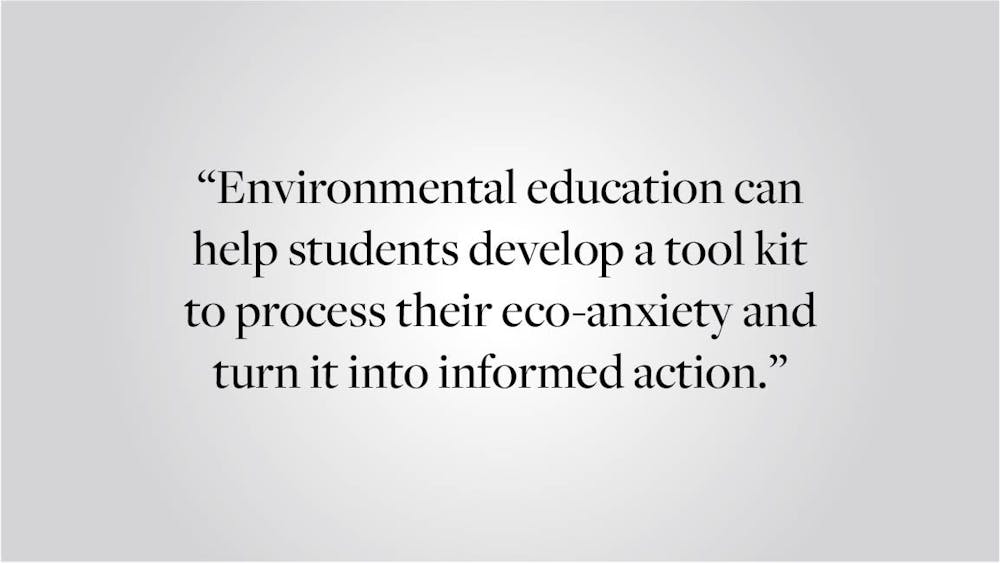Stressed about impending environmental catastrophe? You’re not alone, and, even better, that stress can actually be productive. Psychologists suggest that eco-anxiety — a persistent sense of fear, guilt and helplessness about the current climate situation — can serve to become the first step in inciting action toward the climate crisis.
In recent years, psychologists have reported a concerning uptick in patients struggling with eco-anxiety. In 2020, more than half of Americans said they were “somewhat or extremely anxious” about the impacts of climate change, according to an American Psychiatric Association poll. In particular, young people account for a high percentage of those experiencing eco-anxiety. Nearly 60% of young people across ten countries expressed extreme worry toward climate change, according to a Bath University survey, which found that they perceived “no future, that humanity is doomed and that governments are failing to respond adequately.” While this eco-anxiety in young people is concerning, it can also be a catalyst for powerful youth climate action.
But converting that anxiety into action is only possible when students are sufficiently prepared to engage in informed discussions on the topic and are provided with the space to do so. In other words, they need environmental education. However, American schools at large currently fail to sufficiently address climate change. An NPR/Ipsos poll shows 86% percent of teachers agreed climate change should be taught in schools. In practice, though, more than 55% of the surveyed teachers did not cover climate change. A survey by the Rhode Island Environmental Education Association showed that while many R.I. teachers believe environmental education to be important, they don’t feel equipped to teach it.
On a national level, few states have integrated environmental education into their public school curricula. Only California and New York have bills that specifically address the importance of environmental education, for example. In the Ocean State, the Climate Literacy Act, which aims to support climate change education in Rhode Island K-12 schools, was introduced as identical bills in the House and Senate in February but died in both chambers.
While the American education system fails to implement environmental education, youth eco-anxiety persists. That “extreme worry” occupies young people’s minds as they run their errands, scroll through their phones and lie down to sleep. At least I know it is for me. That energy can be directed toward creating effective environmental action — like pushing their school and community to reduce waste, or volunteering in local climate action groups — instead of just driving downward spirals and doom scrolls.
Environmental education can help students develop a tool kit to process their eco-anxiety and turn it into informed action. Not only will students learn to apply problem-solving and critical thinking to environmental issues and their causes, but they will also address their shame and guilt — both of which are important components of eco-anxiety — by learning about the systemic operations that propel climate change. For example, students can discuss how corporations place environmental responsibility on consumers by popularizing phrases like “personal carbon footprint.”
Converting those negative emotions to positive change not only helps the individuals going through the process, but works to address a pressing global issue. . Acknowledging and understanding the drivers behind climate change, like international mega-corporations such as Shell or British Petroleum, can alleviate students’ individual guilt and encourage a healthy, empowering sense of responsibility to effect change. By overlooking environmental education, schools are missing out on an opportunity to help students establish a healthier understanding of their role in climate change and address their own negative feelings.
Some students in the United Kingdom are case studies in turning a negative emotional response into effective action — after struggling through eco-anxiety without any guidance, they began facilitating workshops with Forces of Nature, a youth-run NGO that aims to facilitate that conversion precisely. These workshops help students to recognize their anxiety and facilitate discussions that prompt them to see the power of their collective emotions. According to students who participated in these workshops, they feel “a renewed sense of power to create change.” Environmental education, as part of public school curricula, would have a similar effect as these workshops — but would motivate a much wider audience with an even more in-depth approach.
It will be a long time before environmental education becomes incorporated into curricula across all public school systems. But both policy-makers and educators must place it higher on the agenda, because climate change and students’ overwhelming anxiety cannot wait.





